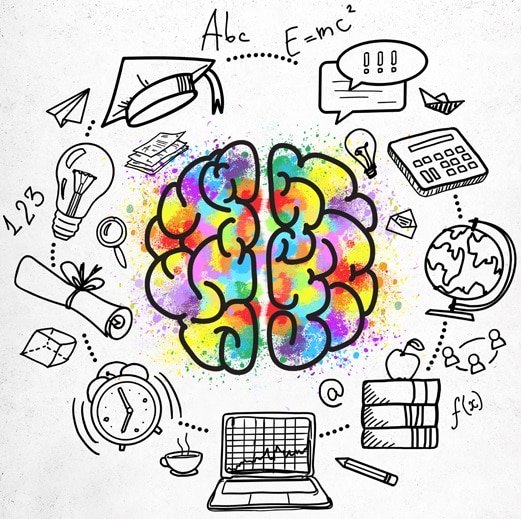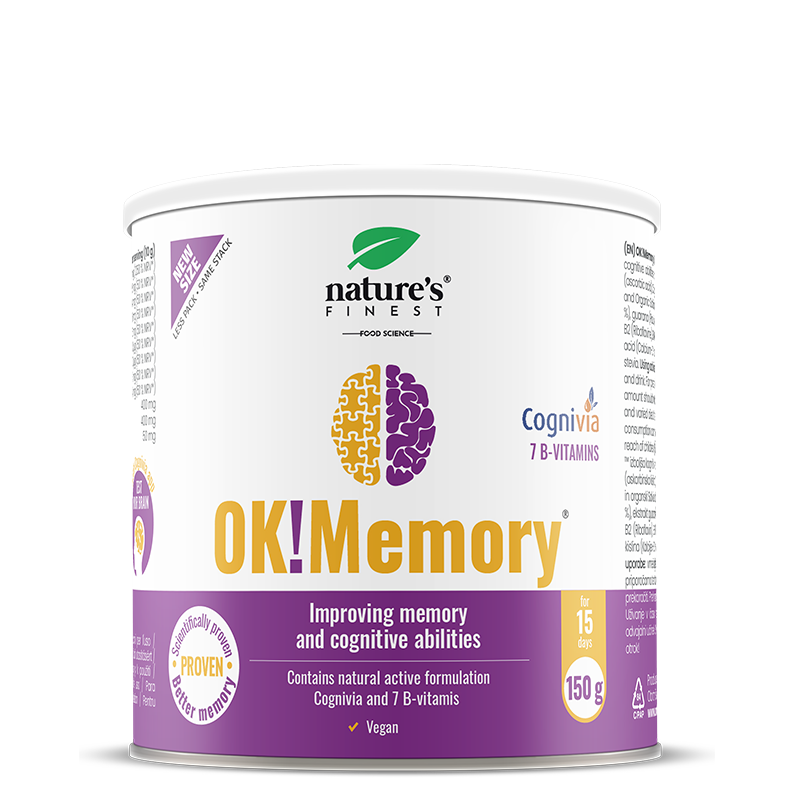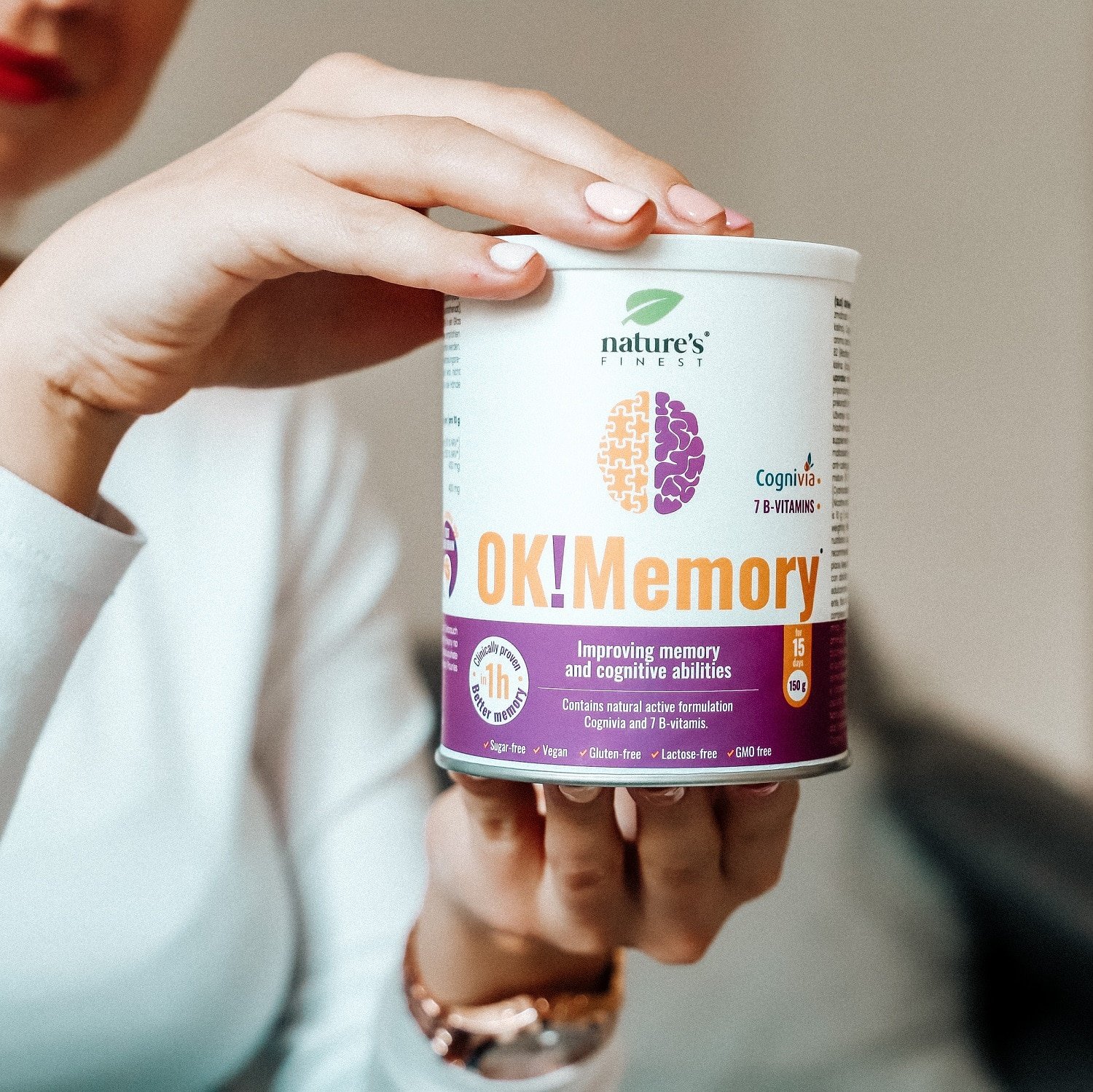Natural techniques to improve memory
What is memory?
Memory is a mental activity with which we recall information that we have already experienced or learned in the past. It is a complex system based on many brain processes and is a key part of our lives. People learn a lot of things through life. We learn to speak, read, write, walk, ride a bike, a car, learn foreign languages and various other things. And this shows what an important part of our lives memory actually is. None of us can imagine that we would have to learn the same, most basic things every single day.
We know several types of memory
The first is sensory memory. It is a direct, instantaneous memory that lasts only a fraction of a second. Sensory stimuli perceived by our senses are recorded and stored in the sensory memory. The second is short-term or working memory. The data is stored as long as it is important to perform a task. After completing the task, we forget this information. An example might be repeating a phone number that we only remember for the time we need it. On average, we remember seven units at a time. With age, our short-term memory becomes shorter, making it harder to perform certain tasks. The third type of memory is long-term memory. From short-term or working memory, information is transferred to long-term memory through repetition. Long-term memory is divided into three groups. These are episodic, semantic, and procedural memory.
Episodic memory is the memory of past events that happened to us and are related to a specific time and place. Semantic memory is the memory for data that is not tied to space and time. This includes general knowledge of facts, subjects, events, for example, most school knowledge. Procedural memory, on the other hand, is a memory of the skills we have learned and stores knowledge of how to perform certain processes, from cognitive to motor skills. This includes e.g. driving a car, skiing.
Memory is therefore the ability to store and preserve information, a prerequisite for the smooth operation of memory is the ability to effectively process information and the ability to pay attention. It is a condition for the functioning of many cognitive functions, and at the same time, it depends on the functioning of other cognitive processes. Several areas of the brain are responsible for memory, the most important being the hippocampus, amygdala and cerebral cortex. The hippocampus is the brain structure that is most important in processing information. The amygdala is an almond-shaped area located next to the hippocampus and is responsible for processing emotions and helps us imprint emotion-related memories. The cerebral cortex, or cerebral cortex, is the outer layer of the brain that stores most of the long-term memory in different areas. The area depends on what the new information is, whether we have heard something, seen something or whether we are solving a problem. We have special areas in the brain for speech, vision and hearing, so memory is also stored in different areas.
How is memory formed and maintained?
The process of forming and preserving memory goes through three stages. The first step is to receive or encode the information. For which we need focused attention because otherwise the information passes us by and we do not accept it. The second stage is storage and consolidation. When information is received in the brain, the hippocampus sends a signal to store it in long-term memory. Storing this information is easier if it is associated with a stronger emotional response. The third stage is recall. When we want to retrieve information from long-term memory, the same neural connections are activated as in the process of storing information. If we use this information more than once, we will also recall it more easily and quickly from memory.
-30%

OK!Memory
IMPROVE CONCENTRATION AND MEMORY!
- Cognivia™ formula is clinically proven to improve memory quality ¹
- A natural blend of active ingredients to improve cognitive performance ¹
- Helps maintain memory, which declines with age ¹
- It helps maintain optimal concentration and memory at work ¹
- Prevents fatigue and exhaustion ⁴
- Effective for the younger and older population ¹
Net 150 g | for 15 days
Regular price: £21.75
£15.22
and save £6.53
100% safe purchase with a no-questions-asked return policy.
Why does forgetting occur?
Forgetting is good in certain cases, and we say that forgetting unimportant things allows us to remember important ones. Imagine being able to memorize all the irrelevant information, such as every phone number we’ve ever typed into our phone. However, forgetting also presents problems. Such problems occur when we are tired, overwhelmed, or deep in thought. It happens to us that we forget birthdays, names, students also often forget the things they learned for the exam. Decreased memory is associated with age and other factors that cause the ageing of brain cells. These are mainly disorders of the brain due to lack of oxygen, radiation, toxins in the environment or the intake of harmful substances such as drugs, alcohol and the like. Individual memory failures have already been encountered by each of us, but if they start to occur more often, that can be a sign for us to take action. In the case of forgetfulness, a distinction must be made between normal, age-related and sickness forgetfulness. It has been proven that problems with attention also increase with age, with a decrease in reaction speed and short-term memory capacity. However, problems with recalling information from long-term memory are also increasing. When it comes to forgetfulness, we usually talk about dementia and Alzheimer’s disease. Disease forgetfulness can be alleviated with early detection, medications, and natural techniques.Techniques and ways to maintain a good memory
Do you often forget things, have trouble recalling things from memory, find it difficult to maintain concentration? We have prepared some natural techniques that can improve your memory and thus facilitate both everyday life and effectiveness at work or while studying.1. Memory training
With a variety of memory and attention training exercises, we will effectively maintain mental flexibility and more easily recall information from our memory. Examples of exercises are filling in proverbs or folk pearls of wisdom, solving crossword puzzles, listing words that are related to a particular word, writing missing letters, and so on.2. Regular physical activity
Physical activity increases the supply of oxygen to the brain and reduces the risk of diseases that can lead to memory loss, such as diabetes and cardiovascular disease. Exercises that require greater motor skills can help us the most, and a walk or run in nature will also suffice.3. Sleep
Getting enough sleep is crucial for learning and maintaining a good memory. When we are asleep, our creativity and concentration also increase, which is very important in storing information in our memory. It is advisable to stick to a sleep schedule where we get up and go to bed at the same time every day, even on weekends and public holidays.4. Balanced diet
A good and balanced diet is also necessary for a good memory. Above all, proper glucose supply is important, which is crucial for blood circulation to the brain. It is recommended to eat foods high in omega-3 unsaturated fatty acids, vitamins C, A, E and D, and minerals and fibre. Foods such as fish, onions, dark vegetables and berries are fitting. It is advisable to avoid excessive food intake, with a high content of refined sugar, as well as to reduce alcohol intake.5. Learning strategies
The processing of information must be adapted to the characteristics and abilities of the individual. When learning, we can use various strategies that can help us have a better memory.- Good attention. It is important to focus only on the information we want to remember and not do more things at the same time. It is better to learn in silence, without distractions.
- Involvement of different senses. Information can be associated with colours, smells, tastes, and in this way, it is easier to remember information.
- Choosing the right learning style. When storing new information, it is good to know which type of learning suits us best. Whether it’s the visual type or the auditory type. Is it easier to remember information if we see or read it, or is it easier for us to hear something?
- Connecting information with things we already know. It will be easier for us to remember something if we connect it with things that are already in our memory.
- Organizing information. We can help ourselves by writing down information to notes, reminders, etc.
- Association to rhymes or jokes. Combining new information with jokes or creating rhymes can help us store them in our memory.
- Repetition of what has been learned. The more times we repeat the learned thing, the easier and faster we will recall it next time.

6. Use of nutritional supplements
Memory can also be improved with the help of dietary supplements such as vitamins B, C and E, folic acid, etc. A novelty on the market is the OK! Memory drink, a product that has been clinically proven to improve working memory, the quality of our memory and long-term memory within 1 hour after using the product. It also improves the quality of memory and our cognitive abilities while using the product. It helps us maintain mental well-being as it maintains concentration, memory and attention.
OK! Memory contains Cognivia, which has been clinically proven to improve cognitive functions and working memory. It is a plant cognitive enhancer as it is a blend of Spanish sage essential oil and its leaves. It was developed especially for people who want to improve concentration and memory naturally with the help of herbs. It contains a lot of B vitamins (B1, B2, B6, B12, folic acid), which contribute to normal nerve function. Vitamin C is also added to help protect cells and the normal functioning of the nervous system.
If you also often forget things, you should introduce at least one of the techniques mentioned above in your everyday life and observe how your memory will start to improve. That way no one will be able to tell you that you have a memory like a goldfish.
